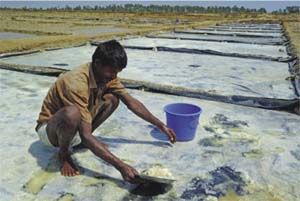The post Mismatch in salt prices appeared first on Dhaka Mirror.
]]> Tk 2 at field, Tk 18 at market
Tk 2 at field, Tk 18 at market“You eat that with everything every day. That is salt, nothing else,” said the driver pointing at the pile of snow-white substance in a barren field on way to Cox’s Bazar.
The salt farmers, seeming long deprived, in torn cloths, were working barefoot making piles of sun dried salt. They would sell the raw salt to the processing factories after drying the seawater in the sun for five days.
Consumers across the country pay over 10 times the price the farmers get for per kilogram of salt. They allege all stakeholders including factory owners and middlemen deprive them in the process.
Different factory owners purchase the salt at less than Tk 2 per kg from the field and sell the same volume to consumers at Tk 18-20.
During a recent visit to different salt farms in Teknaf in Cox’s Bazar it was seen farmers were selling salt at Tk 70 per maund (37.5 kg). The price came down from last year’s Tk 100 making many of them reluctant to continue with the business.
“Sometimes we cannot even recover the production costs as salt processing companies import cheap rated raw salt from India and Myanmar,” said Amir Ali, a salt farmer in Teknaf.
Amir said they can produce up to 40-50 kg of salt in one decimal of land in two days. They have to bear all the costs, but the owner of the land takes half of the profit without spending anything, which they think is not a fair share, he added.
The salt farmers bear 97.7 percent of production costs to get only 54 percent of the sale proceed, while land owners and brokers pocket the rest, revealed a report of Transparency International Bangladesh (TIB) and Sachetan Nagorik Committee (Sanak) in a survey report in 2008.
Around 44,500 families are engaged in salt cultivation in 75,000 acres of land that produced around 1.7 million tonnes of salt against the target of 1.34 million tonnes in 2009-10.
The farmers have long been deprived as the government did not have any salt policy.
“Now the government has made a policy, which protects the interest of the salt farmers,” said Mostafa Kamal Akand of Coast Trust, a non-government organisation working for the salt farmers.
The mill owners’ syndicate compels the farmers to sell their product at a cheaper rate. Otherwise, they import it from India, though Bangladeshi farmers are capable of meeting the country’s demand, he said.
“But now the government has decided that the mill owners have to pay Tk 4 for a kg,” he added.
Asked why the Indian farmers’ rate is cheaper, Mostafa Kamal said they produce the salt on government land.
“So they don’t need to pay rental for the land on which they produce the salt. On the other hand, here the farmers have to rent land at Tk 15,000 to Tk 20,000 per year,” he said.
Without having any policy, the country’s salt sector remained one of the most neglected sectors over the years since independence. Finally, the government last month approved the draft National Salt Policy, 2011 to protect the interests of all stakeholders including the farmers, mill owners and consumers.
The special features of the salt policy include discouraging salt import, fixing fair price, providing farmers and mill owners with loans on single digit interest, developing a buffer stock, increasing production through providing technical assistance to farmers, collection and preservation of information related to salt, and providing farmers with infrastructural assistance during natural calamities, say sources in the industries ministry.
In the salt policy, it was said if import of salt during surplus production continues, tariff and non-tariff barriers will be imposed to prevent such import for the sake of the local industry.
Under the policy, steps will be taken to augment salt production by increasing salt-growing land and farmers will be encouraged to produce white salt through BSCIC-invented polythene method.
The government however will facilitate the import of industrial salt for preparing chemical products.
Nearly half a million people are engaged in the salt industry directly and indirectly, the sources add.
Courtesy of The Daily Star
The post Mismatch in salt prices appeared first on Dhaka Mirror.
]]>